古琴介绍PPT (英文)
- 格式:pptx
- 大小:6.83 MB
- 文档页数:18

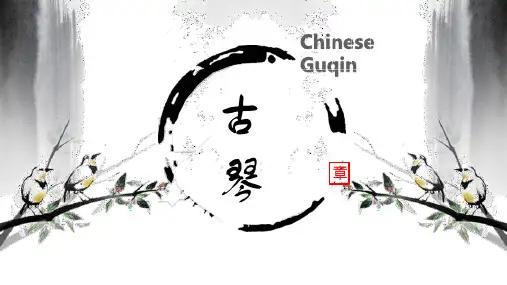
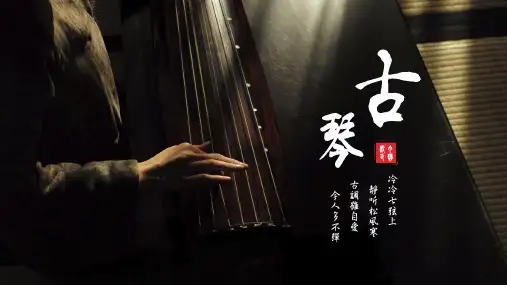
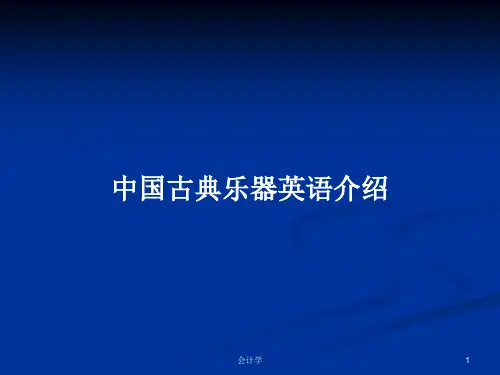
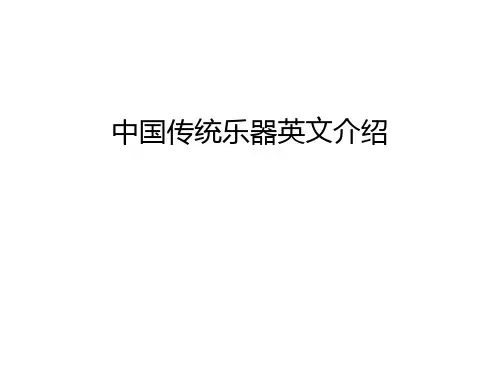
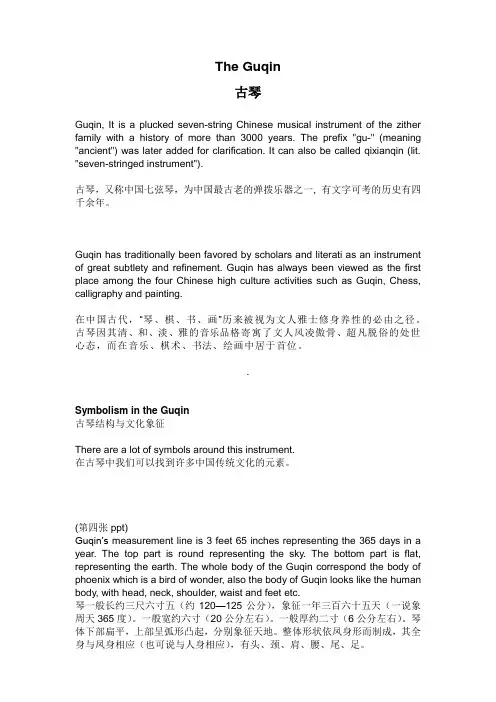
The Guqin古琴Guqin, It is a plucked seven-string Chinese musical instrument of the zither family with a history of more than 3000 years. The prefix "gu-" (meaning "ancient") was later added for clarification. It can also be called qixianqin (lit. "seven-stringed instrument").古琴,又称中国七弦琴,为中国最古老的弹拨乐器之一, 有文字可考的历史有四千余年。
Guqin has traditionally been favored by scholars and literati as an instrument of great subtlety and refinement. Guqin has always been viewed as the first place among the four Chinese high culture activities such as Guqin, Chess, calligraphy and painting.在中国古代,“琴、棋、书、画”历来被视为文人雅士修身养性的必由之径。
古琴因其清、和、淡、雅的音乐品格寄寓了文人风凌傲骨、超凡脱俗的处世心态,而在音乐、棋术、书法、绘画中居于首位。
.Symbolism in the Guqin古琴结构与文化象征There are a lot of symbols around this instrument.在古琴中我们可以找到许多中国传统文化的元素。
(第四张ppt)Guqin’s measurement line is 3 feet 65 inches representing the 365 days in a year. The top part is round representing the sky. The bottom part is flat, representing the earth. The whole body of the Guqin correspond the body of phoenix which is a bird of wonder, also the body of Guqin looks like the human body, with head, neck, shoulder, waist and feet etc.琴一般长约三尺六寸五(约120—125公分),象征一年三百六十五天(一说象周天365度)。
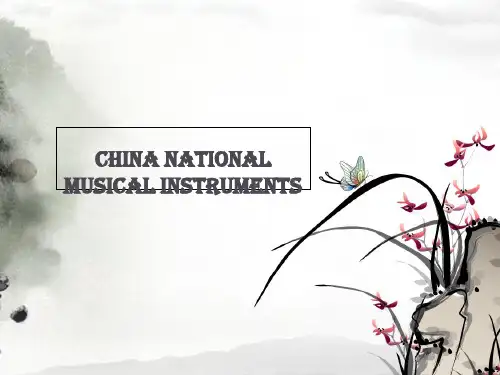
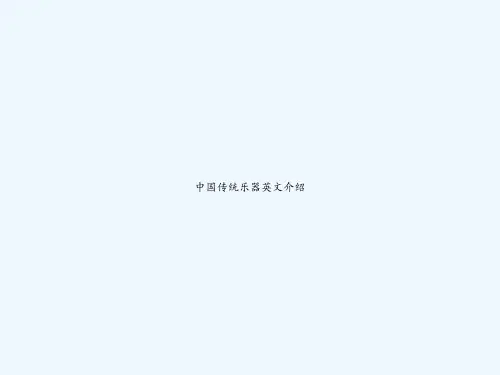


(数字为对应ppt的页数)3. Guqin, It is a plucked (弹拨)seven-string Chinese musical instrument with a history of more than 3000 years. The prefix "gu-" (meaning "ancient") was later added for clarification. It can also be called qixianqin (lit. "seven-stringed instrument").古琴,又称中国七弦琴,为中国最古老的弹拨乐器之一, 有文字可考的历史有四千余年。
4. It has been played since ancient times, and has traditionally been favored by as highlighted by the quote “a gentleman does not part with his qin or se without good reason,” as well as being ass ociated with the ancient Chinese philosopher Confucius.(琴是中国古代文化地位最崇高的乐器,有“士无故不撤琴瑟”和“左琴右书”之说。
位列四艺“琴棋书画”之首,被文人视为高雅的代表,亦为文人吟唱时的伴奏乐器,自古以来一直是许多文人必备的知识和必修的科目)5. 1. ConstructionEach part of the qin has meaning.According to tradition, the qin originally had five strings, representing the five elements of metal, wood, water, fire and earth. Later,, Zhou Wen Wang added a sixth string to mourn(哀悼)his son。
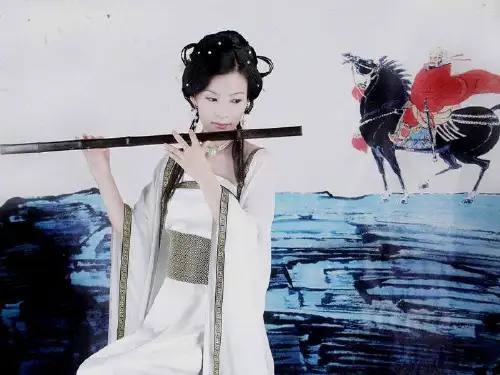
古琴英文介绍篇1The guqin, an ancient musical instrument with profound charm and history, is truly a wonder to behold! Its appearance is a combination of exquisite craftsmanship and artistic beauty.The shape of the guqin is often elongated and elegant, like a slender vessel carrying the sounds of ages. The materials used in its making are carefully selected. Commonly, paulownia wood and catalpa wood are favored for their excellent acoustic properties. These woods not only contribute to the rich and resonant tones but also give the guqin a natural and warm texture.Take, for instance, the renowned "Jiu Xiao Huan Pei" guqin. Its body lines are so gracefully curved, as if they were drawn by the hand of a master artist. The unique qin emblems on it add a touch of mystery and sophistication. They are like stars shining on a dark night, guiding the player and the listener into a world of profound emotions.The decorations on the guqin are also remarkable. Intricate carvings and inlays showcase the artisan's dedication and skill. Every detail is a testament to the love and respect for this musical treasure.Oh, the guqin! How can one not be captivated by its beauty and charm?篇2The guqin, an ancient musical instrument with a profound history, has its roots tracing back to thousands of years ago. Oh, imagine the ancient times when it first emerged and began to charm people's hearts!It played a vital role in the lives of ancient scholars. In the Tang Dynasty, it was highly regarded and became a symbol of elegance and refinement. How wonderful it was! And in the Song Dynasty, its playing techniques and styles continued to evolve and diversify.One cannot fail to mention the significant contributions of famous guqin masters. For instance, Ji Kang, a renowned figure in ancient times, devoted his life to the pursuit and promotion of the guqin. His passion and talent made the guqin even more renowned and respected.The guqin is not just an instrument; it is a vessel carrying the wisdom and emotions of our ancestors. Isn't it amazing how it has endured through the ages and still holds such a special place in our hearts and culture?篇3The Guqin, an ancient musical instrument with a profound history and cultural significance, is truly a wonder to behold! The playing techniques of the Guqin are highly sophisticated and diverse. Its fingerings, such as the "harmonic", "stopped note", and "gliding note", each have their unique charm. The harmonic creates a delicate and ethereal sound, as if it were agentle breeze caressing your ears. How astonishing is that? The stopped note produces a rich and profound tone, carrying a depth of emotion that touches the soul. Isn't it remarkable? The gliding note adds a flowing and smooth quality to the music, like a gentle stream meandering through a peaceful valley.When it comes to the timbre of the Guqin, it stands out distinctively from other instruments. Compared to the bright and resonant sounds of a piano or the lively tones of a violin, the Guqin has a mellow and introspective quality. Its tones are often described as being like the whispers of an ancient sage, carrying wisdom and serenity. Why is it so special? It has a unique ability to evoke a sense of tranquility and reflection within the listener. Isn't that a remarkable quality? The Guqin is not just an instrument; it is a vessel that conveys the depth and beauty of Chinese culture and the profound emotions of the player. How wonderful it is to have such a treasure in the world of music!篇4The guqin, an ancient Chinese musical instrument, holds an incredibly significant place in cultural heritage! How remarkable it is! The guqin is not merely a musical tool but a vessel that conveys profound emotions and philosophical wisdom. The melodies it produces can touch the depths of one's soul. For instance, some guqin pieces express the tranquility and serenity of the human mind, while others reveal the complexity and turmoilof emotions. How powerful these expressions are!In modern society, the inheritance and protection of guqin culture face numerous challenges. How can we ensure its survival and continuation? One way is through education, introducing the guqin to more people and teaching them its history and playing techniques. Another approach is to encourage performances and recordings of guqin music, making it accessible to a wider audience. Shouldn't we take active measures to preserve this precious cultural treasure?The guqin is a link connecting the past and the present. It is our responsibility to pass on this cultural gem to future generations. Let us strive to protect and promote the guqin culture. How wonderful it would be if its charm could endure forever!篇5The guqin, an ancient musical instrument of China, holds a profound and unique position in the realm of art and philosophy! It is not merely an instrument but a vessel carrying the wisdom and essence of Chinese culture. The art of playing the guqin demands not only technical proficiency but also a deep understanding of the inner spirit and emotions it conveys.The philosophy behind the guqin is deeply intertwined with traditional Chinese thought. How fascinating it is to discover that the gentle and harmonious sounds of the guqin mirror the concept of balance and harmony in life! The slow and deliberate plucking of the strings seems toguide us to a state of tranquility and reflection. Isn't it amazing how such a simple act of playing can lead us to profound insights about life?The wisdom derived from the guqin's music is like a precious gem. It teaches us patience, as each note is carefully crafted and timed. It also instills in us the importance of simplicity and purity, as the unadorned tones touch the soul directly.In a world filled with noise and chaos, the guqin stands as a reminder of the beauty and depth that lies within stillness and simplicity. What a remarkable instrument it is!。